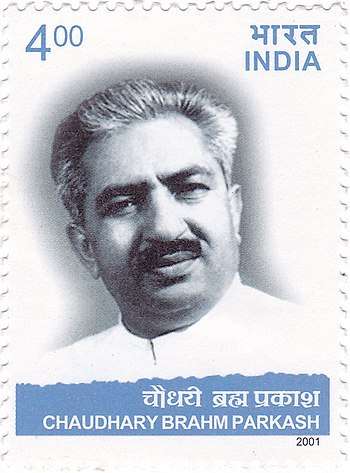Brahm Prakash (politician)
Chaudhary Brahm Prakash Yadav (1918–1993) was an Indian politician, the first Chief Minister of Delhi, and an freedom fighter who played an important role in the individual Satyagraha Movement launched by Mahatma Gandhi in 1940. He was amongst the leaders of the underground activities in Delhi during the Quit India movement. He was imprisoned many times during the freedom struggle.[1][2] He hailed from Shakurpur, a village in south-West Delhi.[3]
Brahm Prakash | |
|---|---|
 | |
| 1st Chief Minister of Delhi | |
| Sher-e-Delhi | |
| In office 17 March 1952 – 12 February 1955 | |
| Preceded by | New Post |
| Succeeded by | Gurumukh Nihal Singh |
| Constituency | Nangloi Jat |
| Member of Parliament, Lok Sabha | |
| In office 1957-1962 | |
| Preceded by | Does not exist |
| Succeeded by | Shiv Charan Gupta |
| Constituency | Delhi Sadar |
| Member of Parliament, Lok Sabha | |
| In office 1962-1967 | |
| Preceded by | Naval Prabhakar |
| Succeeded by | Self |
| Constituency | Outer Delhi |
| Member of Parliament, Lok Sabha | |
| In office 1967-1971 | |
| Preceded by | Self |
| Succeeded by | Chaudhry Dalip Singh |
| Constituency | Outer Delhi |
| Member of Parliament, Lok Sabha | |
| In office 1977-1980 | |
| Preceded by | Chaudhry Dalip Singh |
| Succeeded by | Sajjan Kumar |
| Constituency | Outer Delhi |
| Minister of Ministry of Agriculture & Farmers' Welfare | |
| In office 30 July 1979-14 January 1980 | |
| Preceded by | Surjit Singh Barnala |
| Succeeded by | Rao Birendra Singh |
| Personal details | |
| Born | 16 June 1918 |
| Died | 11 August 1993 (aged 75) Delhi, India |
| Political party | Indian National Congress Janata Party |
| Residence | Delhi, India |
In the post-independence, Prakash served as Minister in charge of Planning and Development as well as the first Chief Minister of Delhi at the age of 34 years, the second-youngest Chief Minister in India in 1952–55.[4][5] His stints in the Parliament twice won him accolades as an able parliamentarian. While he was with Congress Party, he was elected to Lok Sabha from Delhi Sadar constituency in 1957, and from Outer Delhi in 1962 and 1967. He joined Janata Party later, and was elected to Lok Sabha again in 1977 from Outer Delhi. When the party split in 1979, he joined the Charan Singh faction, and became a minister for a few months. He made noteworthy contributions as the Union Cabinet Minister for Food, Agriculture, Irrigation and Cooperatives.[6]
The cause of depressed sections of the society, rural development and empowerment of the weaker sections were issues, which were very close to the heart of Prakash. He was quick to realise the potential of cooperative societies in mitigating the hardships of the village folks. As early as in 1945, he started organising village and agriculture cooperatives. He was also a proponent of the Panchayati Raj institutions. He organised the National Union of Backward Classes, Scheduled Castes, Scheduled Tribes and Minorities in 1977 to work for the welfare of these weaker sections.[7]
Prakash and Dr. Kurien of NDDB promoted the idea of Cooperative Companies to help free the cooperatives from the shackles of Government control through the Registrar of Cooperative Societies. It was a precursor to the present Producer Company model.[8][9][10]
References
- New Delhi News : Briefly. The Hindu (17 June 2006). Retrieved on 2018-11-21.
- Latest Releases. Pib.nic.in. Retrieved on 21 November 2018.
- "History of Delhi Legislative Assembly". Legislative Assembly of Delhi website.
- "Brahm Prakash: Delhi's first CM, ace parliamentarian". Hindustan Times. 27 September 2013. Archived from the original on 1 March 2014. Retrieved 22 January 2014.
- Kamath, M. V. (1996). Milkman from Anand: the story of Verghese Kurien. Konark Publishers. p. 386.
- Puri, Rajinder (13 June 2007) Quota Quagmire.boloji.com
- Misra, Biswa Swarup (2010). Credit Cooperatives in India: Past, Present and Future. Routledge. p. 2.3. ISBN 9781136994036.
- State of the Indian farmer, millennium study. New Delhi: Academic Foundation in association with Dept. of Agriculture and cooperation, Ministry of Agriculture, Govt. of India. 2006. p. 90. ISBN 9788171884940.
- Sriram, Samar K. Datta, M.S.; Sriram, M. S. (2012). Towards a perspective on flow of credit to small and marginal farmers in India. New Delhi [etc.]: Allied. p. 48. ISBN 9788184247602.
External links
- COMMEMORATIVE POSTAGE STAMP RELEASED
- Chaudhary Brahm Prakash Delhi Rajkiya Charak Ayurvedic Sansthan
- Leaders pay tribute to Delhi’s first CM
- Outer Delhi
- Delhi Sadar
- List of chief ministers of Delhi
| Political offices | ||
|---|---|---|
| Preceded by NA (British Raj) |
Chief Minister of the Delhi 1952–55 |
Succeeded by Gurumukh Nihal Singh |